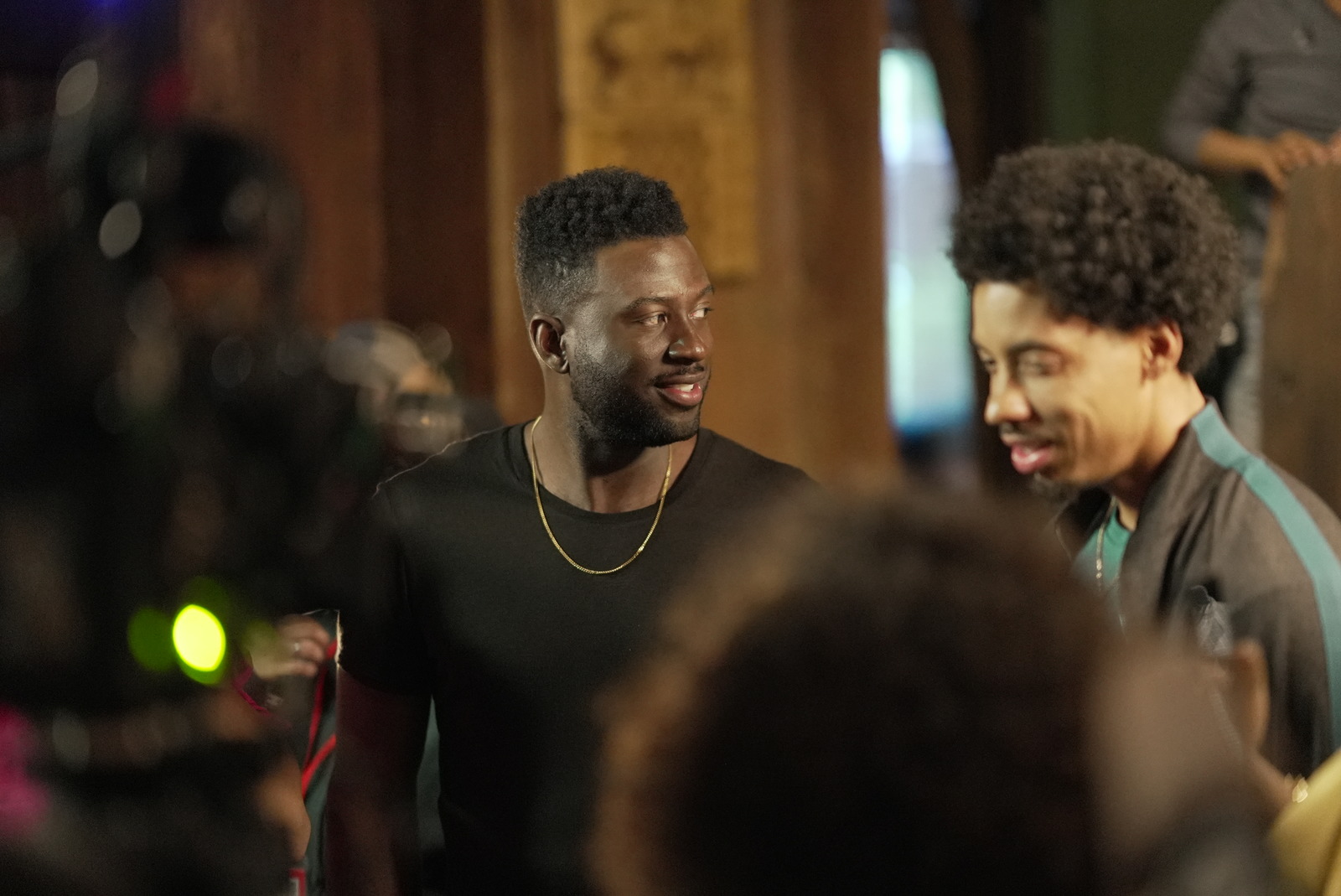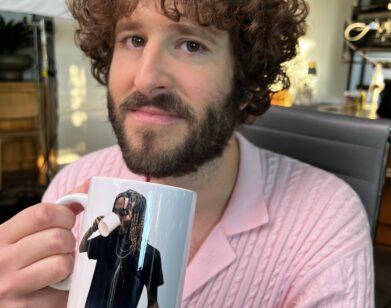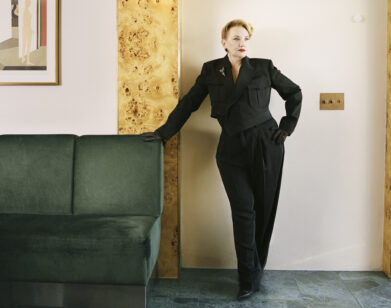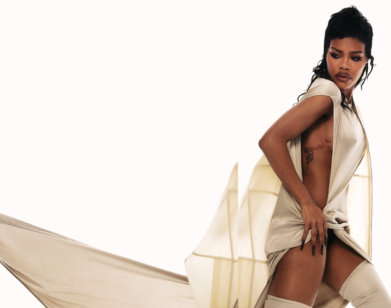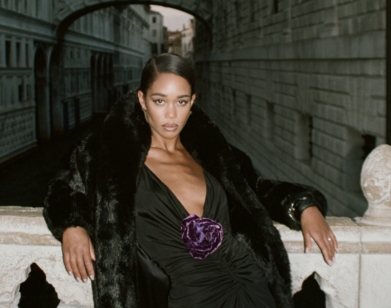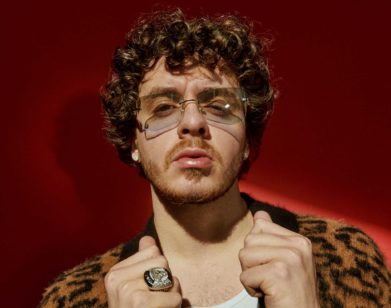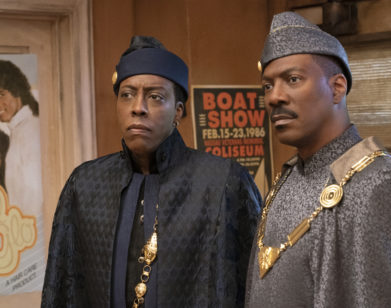Pass the Rock!
Sinqua Walls Is Ready for the Bright Lights
Twenty years ago, a visiting player stepping onto the court of El Segundo High School in Los Angeles would’ve been in for the roughest 32 minutes of his week — because he’d have to go toe-to-toe with Sinqua Walls, a top ten combo guard in the state, and a future McDonalds All-American Game Nominee and Division I player at the University of San Francisco. Now, twenty years later, Walls is still turning heads and dishing the rock — instead now, instead of in a regulation game, it was on the set of White Men Can’t Jump, a remake of the 1992 cult basketball film of the same name. Walls plays Kamal, a former basketball star whose career was plagued by injuries, who partners up with Jeremy (played by rapper-actor extraordinaire Jack Harlow), a vegan, trash-talking gym rat, in order to win a tournament for hundreds of thousands of dollars. Walls, whose recent credits also include the sinister Psychological-Thriller Nanny, as well as a role in The Blackening, sat down with Interview to discuss his return to hoops, what it was like partnering up Harlow, and how to make a remake of an iconic film your own.
JACKSON WALD: How did White Men Can’t Jump come on to your radar? What was the process of auditioning for that character and eventually landing the role?
SINQUA WALLS: It was a really organic process. The first step started with a conversation with Calmatic, our director. He and I actually sat down over Zoom, and just had an opportunity to talk about what he wanted to create, how he saw Kamal’s archetype, and what we can extract authentically in the story. And then after that, Jack [Harlow] and I had a chemistry meeting where they wanted to see if these guys have enough chemistry to do this retelling, to honor what Wesley [Snipes] and Woody [Harrelson] created in terms of chemistry. You have to buy it, right. You have to believe that these two guys actually, at some point, became friends and worked together, And we definitely had that, And so from there, it was like, “Alright, you got the part. Jack got the part. We’re off to rehearsals, and we’re starting to find our language as basketball players. We did a lot of pickup together. So that way we found the flow on the court, knowing each other’s style so that we could play around each other.
WALD: How much of the basketball in the movie was actually choreographed versus natural? Did you just film a bunch of basketball until something felt right?
WALLS: It was both. We would have set choreographed plays and broken plays. So in a normal basketball setting, we might run something and that would be the choreographed camera movement that we would follow, and then on Steadicam, it would be a broken play and we would just play up till six or seven, and capture those moments authentically. So it was always woven in. And I think that’s why the audience really appreciates that you can tell [the basketball] is very natural. There’s one moment in particular, we’re playing on Watt [Oasis Court], Jack passes me a ball, a guy swipes forward, I just go around my back and I finish with a layup that’s not choreographed. There’s another one where we’re running on a fast break, Jack passes me the ball again, and I do a spin move around my defender. And that’s not choreographed. Those are all things that we just found naturally. And if Cal thought it was really good, or if our DP thought it looked really good on the camera, then we would set that as a new move, and then reset choreography around that discovery.
WALD: Once you landed the role and knew that you were playing this character, did you start practicing basketball more regularly? What was it like studying the game from a new angle, not as a player or a fan, but as a performer?
WALLS: I’ve been basketball since I was six years old. So over time, if you see me in a grocery store I’m doing I’m still doing air shots, I’m still trying to perfect my follow-through. Those are things that are always going to be part of my innate sensibility. I still always go to court every now and again, just to make sure I can go left a little bit, I can go right a little bit. But when it got specific to wanting to play Kamal, and knowing that we want to have spectacular moments, I really just went to the gym every day and started practicing moves that would look good on screen and that I can call on consistently, and trying to find them in the body moment and attitude that is Kamal.
WALD: When you went to the gym, was it solo? Or did you have a trainer that you were working with?
WALLS: It was a bit of both. I love being in a gym by myself. That’s something that’s still therapeutic to me. But also if I was at the gym at 11 o’clock at night, Khalid Mutakabbir, our basketball trainer, would come and we’d just run through things. We would play one on one, and we would just find different ways to get things to be very fluid and refined. I would work out at lunchtime as well. That’s one thing that I think a lot of people probably didn’t know, except for our basketball staff. I would go in at lunch and try to shoot about 200 to 300 shots a day while we were filming the movie.
WALD: You were all-conference in high school and a McDonald’s All-American nominee. You even played in college. Were you able to take some of your own personal experience from playing basketball as a young man, and impart that onto character?
WALLS: Definitely. When you grow up playing at an elite level, everyone has the same delusions and desires of winning and make it to the highest level, which is the NBA. So much like my career transition into becoming an artist and an actor and a performer, there was a large part of my first love, basketball, being cut short. And so in many ways what I was able to put into Kamal was someone whose opportunities in life got cut short, but he still has the potential to reach there. And so I tried to really use some of my experience to translate that to where he was at that time and just go back to that space when I knew basketball was ending for me. And I was okay with it because I knew I had maximized my potential at that time. But for someone like Kamal, when it was ending for him, [he still knew] that every time he steps on the court, he’s still one of the best players. And that’s what I love about the element of mental health that we infuse into the movie, because his performance anxiety has very little to do with his ability to compete, and more to do with his mental state. And in life, regardless of what vocation were in, it’s our minds that can hold us back more than anything that we actually are capable of.
WALD: What was the process for you of adopting a character that has all this lineage and legacy? How did you go about making this version of Wesley Snipes’ original character your own?
WALLS: The first conversation was with Calmatic, about how close are we going to make this guy to Sidney Deane, or are we going to depart from Sidney Deane? And I think it was a complete departure. So that was able to free me to have my own landscape [to determine] how I wanted to make this character. But also, I went back, and watched the movie several times, just to understand what I love about Sidney. And what I love about [both him] and Kamal is that they’re both family men, they’re both coming home to take care of their kids, and showing love. I definitely think that more representation of that, specifically as a black man in society today, is so important.
WALD: The rapport between you and Jack is so palpable — it really feels like easy chemistry. Was that an instant thing? Did it take time to develop?
WALLS: From our first chemistry read, we just got each other. I think we both really follow the same philosophy in life. I let Jack be Jack, and Jack lets me be me. I think these dynamics when two people have to come together and work together, there’s always someone who’s trying to more aggressively impose their own personal will, as opposed to just allowing things to happen organically. And I think for both of us it was meant in the stars, and as we got to know each other better, our sense of humor became similar, our jokes became similar, and our laughing even became similar.
WALD: It’s also the fact that you’re a classically trained actor, it’s your profession. And he is a musician. It’s impressive that you were able to find this groove with no road bumps as two people coming from significantly different backgrounds.
WALLS: I think the thing about Jack is that he really had the desire to want to get better. And to his credit, I think he knew my backstory, as far as being a trained actor. He had a lot of appreciation and respect for that. So there were a lot of great questions in terms of just how to get into a character, and how to unpack a scene. But I will say to his credit, truthfully, I’m grateful for him as a scene partner. He would ask those questions, and he cared so much. So even though we had different backgrounds in terms of our artistic endeavors, the desire to get better was the same.
WALD: There are so many movies that have come out within the last couple of years that are so basketball centric. Air, Hustle, and even Uncut Gems a couple of years ago. As an actor, and as someone who loves basketball, could you try to articulate to me why you think there is a recent influx of basketball-centric movies?
WALLS: Sports, and basketball, specifically, are so metaphorical to life. You see different people in different aspects of life coming together as a team. It doesn’t always mean you have to be friends, but you have to work together for a common goal. And when people see that on screen, they understand the situation, they understand the character. All of the movies that you mentioned make basketball the backdrop. And if you go back to some of the movies that were made in the 80s, and some in the 90s, basketball was a thing that was front and center — you’d sometimes forget the story and the character, as opposed to now, where basketball brings us into a world, and you’re seeing the life of all these human beings and how they revolve around different circumstances. And I took a movie like our movie and I took a movie like Uncut Gems, and I put it into the world of finance, and I put it into the world of medicine, those same character archetypes would play and I think there’s a relatability to each story with basketball being the backdrop.
WALD: Beyond this movie, you’re in Nanny, and The Blackening is out now. One’s a serious drama, one is a horror comedy, and White Men Can’t Jump is obviously a basketball comedy. How do you adapt to these different roles and playing such wildly different characters?
WALLS: I’ve been blessed to have so many different mentors in my life that have gone on to become actors and movie stars, and also to have studied from a lot of different people who have gone on to set a great precedent in the world of acting. And the biggest thing that I always learned was that everyone that aspires to be a great actor should have range and you shouldn’t want to be relegated to doing one thing only. And so for me, it’s always been intentional to say, “Okay, have I done it before? What makes it different?” And it’s finding those little flickers that make it something that people haven’t seen before so that there is a palette of range. And that’s really my intention each and every time is to continue to say, Okay, how do I show range here? How do I show something different that people haven’t seen?” Because that is always the goal.

